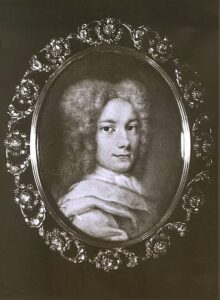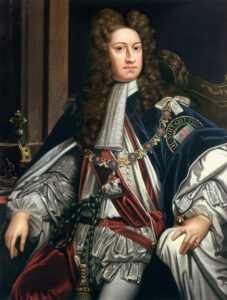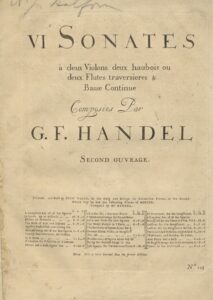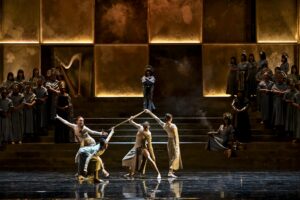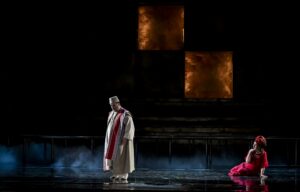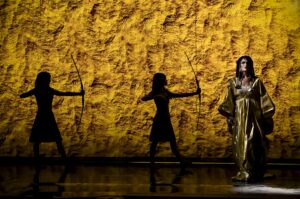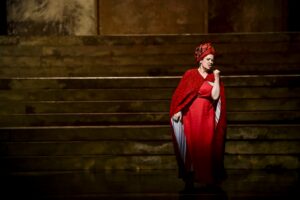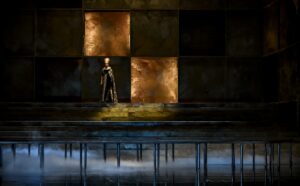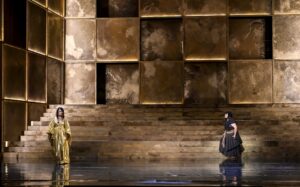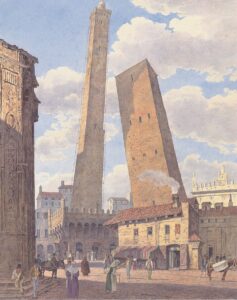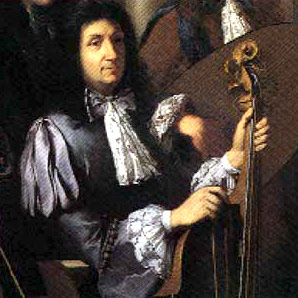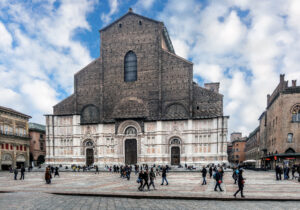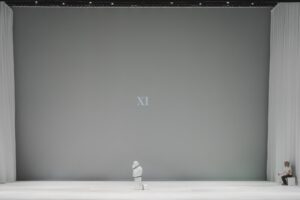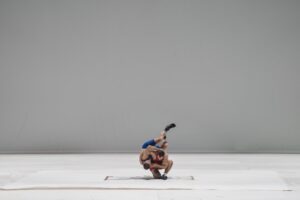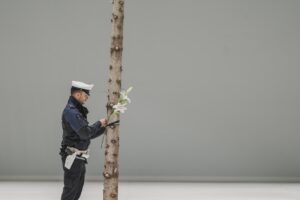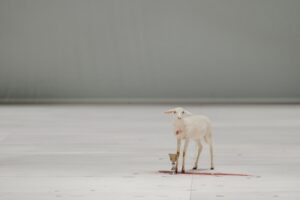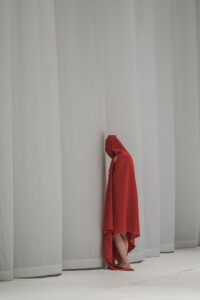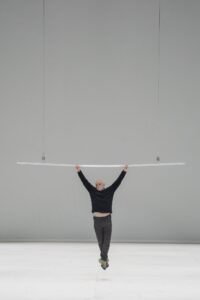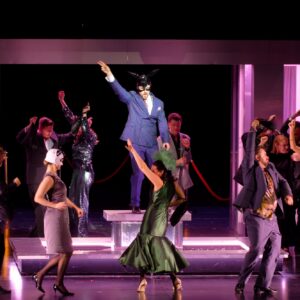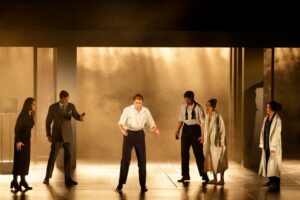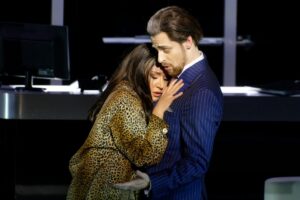Mili moi, w trzeci dzień stycznia 2026 nie pozostaje mi nic innego, jak życzyć Wam – nieodmiennie – mnóstwa najwspanialszych operowych wrażeń i choćby odrobinę mądrzejszego Nowego Roku. Wiem, że zważywszy na obecną sytuację w świecie są to życzenia dość wygórowane, ale trzeba sobie jakoś radzić, najlepiej samemu albo w dobrym towarzystwie. O tym jest właśnie ten tekst, napisany pewien czas temu, przed otwarciem kolejnego sezonu transmisji z Met w warszawskim Teatrze Studio. Część z anonsowanych przeze mnie atrakcji już się wydarzyła, inne stanęły pod znakiem zapytania, ale nie chodzi o detale: chodzi o to, by zebrać się na odwagę i ruszyć przed siebie tropem najtajniejszych marzeń. Do zobaczenia na szlaku – albo we wspomnianym Teatrze Studio, gdzie już 11 stycznia poprowadzę retransmisję z nowojorskiego przedstawienia Andrei Chéniera. Do usłyszenia, zobaczenia i spotkania w coraz trudniejszym do rozpoznania realu!
***
Zabierając się do pisania tego tekstu, uświadomiłam sobie, ile to już razy zachęcałam, błagałam, nieledwie szantażowałam naszych operomanów, by wreszcie wyrwali się z oków rodzimej sceny muzycznej i przekonali na własne uszy, że opera niejedno ma imię, a w teatrach poza granicami naszego kraju dzieją się rzeczy niewyobrażalne dla polskich odbiorców. Niewyobrażalne, co nie zawsze oznacza lepsze – z czego zdają sobie sprawę wielbiciele opery na całym świecie, stanowiący grupę zróżnicowaną i nie zawsze zbieżną z moimi wyobrażeniami o miłośnikach tej formy, przez jednych bezlitośnie wydrwiwanej, przez innych wynoszonej na piedestał zarówno pod względem muzycznym, jak i teatralnym.
Sama – wbrew pozorom – chowałam się od dzieciństwa na inscenizacjach, nazwijmy to, progresywnych, które w latach siedemdziesiątych i osiemdziesiątych ubiegłego wieku trafiały na sceny polskich domów operowych z niemal równą częstotliwością, jak przedstawienia awangardy teatru dramatycznego. Nigdy jednak – podobnie jak przedstawienia Swinarskiego i Grzegorzewskiego – nie mijały się z prawdą dzieła. Wchodziły z nią w ostry, czasem kontrowersyjny dialog, który w słusznie zapomnianych latach dziewięćdziesiątych, wyznaczających w Polsce początek swoiście rozumianego postmodernizmu, skręcił w stronę prowincjonalnego rozrachunku z rodzimą teraźniejszością, estetyki, która stopniowo zaczęła oddalać naszą scenę od nieustannie ewoluujących prądów teatralnych w innych częściach Europy.
Kłopot w tym, że w tym plemiennym nurcie zastygliśmy, przestaliśmy się interesować czymkolwiek, co dzieje się w teatrach poza granicami Polski. Wiadomości o imponujących sukcesach naszych śpiewaków i reżyserów łykamy jak pelikany, nie próbując ich nawet weryfikować ani zestawiać z triumfami innych, uznanych na całym świecie inscenizatorów i muzyków. Co jednak najistotniejsze, przestaliśmy trzeźwo oceniać politykę repertuarową i obsadową polskich teatrów, które nawet w najczarniejszych latach PRL-u były ważnym punktem odniesienia dla melomanów, krytyków i historyków formy operowej.
Być może i ja nie poświęciłabym temu przesadnej uwagi, gdyby nie fakt, że wbrew protestom części zespołu „Ruchu Muzycznego” – choć za namaszczeniem Ludwika Erhardta, ówczesnego naczelnego – zostałam przed laty szefową stworzonego z mojej inicjatywy działu operowego. Z początku miałam zamiar sprawować w tym dziale wyłącznie funkcję redaktorki. Tak się jednak złożyło, że w krótkim czasie musiałam zająć się pracą stricte krytyczną, a tym samym odnieść się nie tylko do własnych, z gruntu nieobiektywnych doświadczeń z wczesnej młodości, lecz także do wiedzy, którą przez lata zdobywałam między innymi za sprawą Józefa Kańskiego i Olgierda Pisarenki, oraz do rozwijanych przez prof. Ewę Łętowską i Piotra Kamińskiego fascynacji historią tradycji wykonawczych i repertuarowych w krajach związanych najściślej z ewolucją tej formy.
Tak się w pewnej chwili poukładało, że jedyną drogą przekazywania mojej wiedzy i miłości do opery – zarówno wielbicielom, jak i fachowcom – okazała się działalność niezależna, pozwalająca dokonywać swobodnych wyborów zarówno w dziedzinie repertuaru, jak i obsady, kierownictwa muzycznego oraz ekipy realizatorów spektakli. Przed kilkunastu laty czułam się w tej materii jak kompletna nowicjuszka – przyzwyczajona do arcypolskiej tradycji niewychylania się przed szereg, czekania, aż zaproszą, zdawania się na decyzje zwierzchników. I nagle wyszło na jaw – jak za dotknięciem czarodziejskiej różdżki – że mój dotychczasowy dorobek w pełni uprawnia mnie do ubiegania się o akredytacje w najbardziej prestiżowych teatrach Europy. Zwłaszcza że niemal od razu zagwarantowałam organizatorom, że swoje recenzje i relacje z większych przedsięwzięć będę im przekazywać w wersji dwujęzycznej, polskiej i angielskiej.
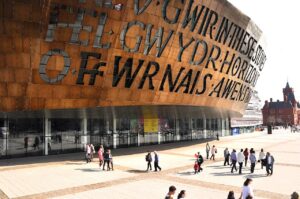
Gmach Wales Millennium Centre w Cardiff. Fot. Lewis Clarke
Rozglądałam się wśród znajomych, którzy nie mogli żyć bez muzyki, słuchali jej czujnie i potrafili docenić prawdziwy kunszt wykonawczy, a nie tylko chłodną perfekcję warsztatową. Dostrzegłam dziwną prawidłowość: prócz oczywistej muzykalności wszyscy odznaczali się bujnym życiem emocjonalnym, abstrakcyjnym poczuciem humoru, ogromną wrażliwością na specyficzny język opery i wybitnie ścisłym umysłem. Przejawiali też zgubną skłonność do rozproszenia uwagi, która uchodzi za jeden z kluczowych objawów patologicznej prokrastynacji. Pomyślałam sobie, że ja – niespodziewany wyrzutek poza rozpychającą się we współczesnej kulturze rzeczywistością korporacyjną – znajdę w nich świetnych kompanów do moich nowych, tym razem operowych podróży. Kiedyś – za łaskawym przyzwoleniem redaktora naczelnego – wybierałam się przynajmniej dwa razy w roku na wyprawy w Himalaje, na dolce far niente z przyjaciółmi w krajach śródziemnomorskich i rozmaite wolontariaty. Zawalałam wszystkie terminy, solennie obiecywałam poprawę i przy kolejnym zadaniu powtarzałam ten schemat co do joty – tymczasem szef czekał cierpliwie, aż dojdę do siebie i wrócę w krytyczną koleinę. Podobno nigdy nie żałował.
W towarzystwie pokrewnej mi duszy wybrałam się w swoją pierwszą niezależną podróż operową w miejsce zupełnie nieoczywiste, mianowicie do walijskiego Llandudna, w dziedzinę rozfalowanych wzgórz, zaskakująco barwnego morza i rozległych połaci dziewiczej przyrody. Do krainy, której język nie zna ponoć słowa „problem”, za to wyróżnia ponad trzydzieści różnych rodzajów deszczu. Która pośród innych instytucji kultury ma także swoją Operę Narodową (po walijsku Cenedlaethol Cymru), w zasadzie wędrowną, bo choć przedstawienia premierowe odbywają się w gmachu Wales Millennium Centre w stołecznym Cardiff, zespół po kilku tygodniach rusza w trasę wykraczającą poza granice Walii. Jej dyrektorem był wówczas doskonale znany w Polsce librecista i reżyser David Pountney – co zapewne ułatwiło mi zdobycie darmowych biletów na kilka przedstawień, choć wtedy, szczerze mówiąc, nawet się nad tym nie zastanawiałam.
Nie posiadałam się wówczas ze szczęścia, że prócz wycieczek na walijskie klify oraz idyllicznych chwil spędzonych z przyjaciółką w rodzinnym pensjonacie z widokiem na morze, udało mi się – po raz pierwszy w życiu – usłyszeć i obejrzeć Carmen Bizeta w pierwotnej wersji z dialogami. Dopiero na miejscu uświadomiłam sobie, jak bardzo potrzebowałam wytchnienia od tych wszystkich inscenizacji z bykiem, kolorową Sewillą, tytułową bohaterką w czarnej mantylce albo – przeciwnie – ucharakteryzowaną na blond-wampa w czerwonej sukience, od łzawego, wzbudzającego współczucie Don Joségo i prężącego muskuły Escamilla. W tym najmniej spodziewanym miejscu na świecie doświadczyłam inscenizacji dwóch zwariowanych Francuzów, Patrice’a Cauriera i Moshe Leisera, która przywróciła mi wiarę w najczystszą moc opowieści muzycznej.
I natychmiast po tym doświadczeniu zaangażowałam się w misję przekonywania polskich melomanów, żeby poszli za moim przykładem i ruszyli w świat. Od początku szło mi opornie. Mało kto wierzył, że operowe podróże kosztują mniej niż wycieczki all inclusive w zdecydowanie mniej atrakcyjne miejsca z katalogów biur podróży. Moja wiarygodność spadła niemal do zera, kiedy postanowiłam się wybrać na jeden z najdziwniejszych i najbardziej elitarnych festiwali operowych w Europie. Znajomi i przyjaciele popatrywali na mnie podejrzliwie. Zastanawiali się, czy wygrałam w totolotka, odziedziczyłam spadek po bogatym krewnym z zagranicy, czy może dorobiłam się na jakichś pokątnych interesach.
Tylko ja wiedziałam, ile takie przedsięwzięcie wymaga zachodu, determinacji i zwykłej ludzkiej pomysłowości. Zaczęło się od wstępnej kalkulacji. Zaplanowałam rzecz z dostatecznym wyprzedzeniem, by zyskać pewność, że w razie czego zdążę się zapożyczyć, wystąpić o kredyt albo zorganizować udany napad na bank. Postanowiłam wziąć organizatorów z zaskoczenia i rok wcześniej wystosowałam do biura prasowego sążnistą epistołę, chwaląc się dotychczasowymi osiągnięciami w dziedzinie krytyki operowej i przypisując sobie szereg zasług, których jeszcze nie zdołałam położyć na tym polu. Ku mojemu zdumieniu odpowiedzieli, wprawdzie po dwóch miesiącach i z wyraźnym zamiarem zniechęcenia mnie do dalszych prób starania się o bilety, ale za to bardzo uprzejmie. Nie dałam za wygraną. Ugięli się po kolejnych dwóch miesiącach.
Pierwszy etap batalii uznałam za pomyślnie zakończony. Drugi okazał się znacznie trudniejszy. Biuro prasowe spytało, w jakich warunkach życzę sobie spędzić piknik po drugim akcie. Odczekałam z odpowiedzią, aż zabraknie miejsc w wytwornej restauracji festiwalowej, i z udawanym rozczarowaniem przystałam na propozycję zarezerwowania stolika na świeżym powietrzu. Przykazano mi zjawić się z własnym prowiantem, schludnie zapakowanym w kosz piknikowy. Opłatę za rezerwację potrącono bez zbędnych ceregieli z zarejestrowanej wcześniej karty kredytowej.
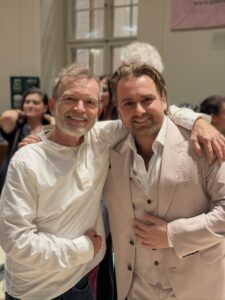
Christoph Rousset i Rafał Tomkiewicz. Fot. z archiwum artystów
Tak było lat temu dziesięć z okładem. Od tamtej pory – bez specjalnych starań – urosłam do rangi mile witanej bywalczyni wspomnianego festiwalu, czyli „angielskiego Bayreuth” w sielskim Longborough. Wyłącznie dzięki rzetelnym recenzjom, co jednak najważniejsze, dzięki poszanowaniu miejscowych reguł. A najważniejszą regułą obowiązującą w tym maleńkim teatrze w regionie Cotswolds jest odrzucenie snobizmu na gwiazdy międzynarodowych scen, na modnych reżyserów i kosztowne inscenizacje – po to, by w pełni docenić niewiarygodny poziom muzyczny tamtejszych produkcji. Zwłaszcza pod batutą Anthony’ego Negusa, który słusznie uchodzi za jednego z najlepszych wagnerzystów na świecie, ale mało kto o tym wie, bo dyryguje prawie wyłącznie w Longborough i w Melbourne – między innymi dlatego, że nad każdą premierą pracuje miesiącami i na własnych zasadach. Z takim skutkiem, że nieżyjący już Michael Tanner – legenda brytyjskiej krytyki operowej – po jego Tristanie oświadczył, że Bayreuth może się schować, a szacowny „New York Times” poświęcił wydarzeniu całą rozkładówkę: czyli objętościowo więcej niż tekst, który właśnie Państwo czytają.
Co kraj, to obyczaj. Zdziwiłam się przy odbiorze biletu prasowego w Badisches Staatstheater Karlsruhe, kiedy przemiła pani wręczyła mi nie tylko program, ale i pękającą w szwach kopertę z kilkudziesięcioma pieczołowicie zeskanowanymi i wydrukowanymi recenzjami z premiery, która poszła tydzień wcześniej w tej samej obsadzie. Tak na wszelki wypadek, żebym nie wyrwała się przed szereg. Całkiem niepotrzebnie: w pełni doceniłam słynny „Ring Czterech Reżyserów” – po jednym na każdą część tetralogii – skompletowany ostatecznie w Karlsruhe w 2018 roku. Trzem z młodych realizatorów otworzył drogę na Zielone Wzgórze. Między innymi Yuvalowi Sharonowi, współtwórcy znanej również polskim melomanom inscenizacji Lohengrina z Piotrem Beczałą w roli tytułowej. Warto zaznaczyć, że piekielnie utalentowany Amerykanin w najbliższym sezonie zadebiutuje w Metropolitan Tristanem, później zaś, z inicjatywy Petera Gelba, weźmie się za kolejną nowojorską realizację Pierścienia Nibelunga.
To jednak anegdota z dziennikarskiej kuchni. Na wszystkich operowych turystów czekają w podróży inne niespodzianki. W Wielkiej Brytanii – zwłaszcza w teatrach poza Londynem – trzeba się przyzwyczaić do wciąż kultywowanej tradycji buczenia i gwizdania na znak aprobaty po występach solistów w rolach szwarccharakterów. W Niemczech – do gremialnego tupania, swoistego odpowiednika rozpowszechnionej w naszym kraju, choć często nieuzasadnionej owacji na stojąco. Skądinąd w wielokrotnie już wspominanym Bayreuth nie pozostaje nic innego, jak tupać, bo na widowni Festspielhausu jest tak ciasno, że trudno nawet rozprostować nogi, a co dopiero wstać do oklasków. We Włoszech – zwłaszcza w mediolańskiej La Scali – równie często można się spotkać z dzikim aplauzem, jak z dzikimi manifestacjami niezadowolenia rozczarowanych słuchaczy: choć pomidorami już w śpiewaków nie rzucają. Tylko w Szwajcarii do niczego nie trzeba się przyzwyczajać – tamtejsza publiczność reaguje podobnie jak widzowie w Polsce, nagradzając rzęsistymi brawami zarówno miernych śpiewaków, jak i nieudolnych inscenizatorów. Choć i tam trafiają się perełki – jak choćby spektakl Lili Elbe Tobiasa Pickera w Theater St. Gallen, w reżyserii Krystiana Lady, który w 2023 roku słusznie otrzymał OPER! Award za najlepszą prapremierę sezonu na świecie.
Tylko czy naprawdę każdego stać na turystykę operową i doświadczanie tych wszystkich osobliwości na własnej skórze? Zdaję sobie sprawę, że poniekąd jestem uprzywilejowana, jeżdżę bowiem po świecie dość intensywnie, korzystając z dobrodziejstw akredytacji. Nie nadużywam jednak gościnności organizatorów, przyjmując ofertę noclegu wyłącznie w sytuacjach, kiedy teatr sam wystąpi z propozycją pokrycia kosztów pobytu w mieście. Wiem, że tłumaczę się z rzeczy oczywistych: czynię to tylko dlatego, że ogół zainteresowanych wciąż postrzega polskich krytyków – nie tylko muzycznych i nie tylko wolnych strzelców – jako pożałowania godnych pieczeniarzy, utracjuszy lub spadkobierców nieujawnionych fortun.
Tymczasem świat operowy otwiera się coraz szerzej – już nie wyłącznie dla bogaczy, którym najdroższy bilet do wiedeńskiej Staatsoper albo na festiwal w Salzburgu, w cenie kilkuset euro, służy głównie do lansowania się w mediach społecznościowych. Wbrew sentencji przypisywanej Skarbkowi z Góry, złoto nie zawsze idzie do złota. Nieomal na każdy, choćby najbardziej oblegany spektakl w Europie, można w ostatniej chwili dostać się za ułamek pierwotnej ceny biletu. Dojechać albo dolecieć można praktycznie dokądkolwiek: płacąc za tę przyjemność mniej niż za tygodniowe wczasy z rodziną w polskim Władysławowie.
Kto zechce, ten dotrze: choćby na Aidę Verdiego z Piotrem Beczałą w Paryżu albo na występ naszego tenora w tytułowej partii z Andrei Chéniera Giordana w Metropolitan Opera House. Nie ukrywam jednak, że mnie osobiście się marzy, by każdy wyjazd z kraju okazał się dla melomana przeżyciem niezapomnianym nie tylko z powodu udziału polskich śpiewaków w spektaklu – choć coraz ich więcej na europejskich scenach i często łatwiej ich usłyszeć za granicą niż w Polsce, co dotyczy między innymi Rafała Tomkiewicza, Krystiana Adama i Huberta Zapióra. Warto wybrać się w podróż z czystej ciekawości, według jakich kryteriów układa się obsady gdzie indziej, i dlaczego – w przeciwieństwie do większości polskich instytucji – nazwiska artystów anonsuje się czasem z rocznym wyprzedzeniem.
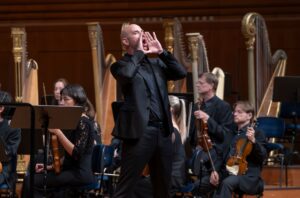
Derek Welton jako Wędrowiec w Zygfrydzie pod batutą Kenta Nagano na festiwalu w Lucernie. Fot. Priska Ketterer
Znam entuzjastów, którzy planują urlopy wyłącznie z myślą o wizytach w operze. Są wśród nich wagnerzyści, znawcy klasycznego włoskiego belcanta, wielbiciele muzyki barokowej i melomani, którzy z zapałem śledzą prapremiery dzieł ulubionych kompozytorów współczesnych. Poniekąd nie mają innego wyjścia – polskie teatry, poza nielicznymi wyjątkami, nie specjalizują się w żadnej z tych dziedzin, kusząc mało wybredną widownię kolejnymi wznowieniami dzieł z żelaznego repertuaru. Wielu operowych wędrowników – rozpieszczonych wrażeniami wyniesionymi z Monachium, Pesaro, Londynu i Aix-en-Provence – nawet nie myśli o konfrontowaniu ich z rodzimą ofertą. Utwierdza się paradoks: dyrektorzy krajowych instytucji przekonują, że Polacy nie dorośli jeszcze do Händla ani Wagnera, na co lekceważeni przez nich Polacy z westchnieniem pakują walizki i jadą szukać szczęścia gdzie indziej – w teatrach i na festiwalach, gdzie nikt im nie będzie wypominał muzycznego analfabetyzmu naszych rodaków. Wielbiciele opery barokowej wylądują w Getyndze lub na Bayreuth Baroque, gdzie oprócz parady najlepszych kontratenorów i męskich sopranów – na czele z Yuriyem Mynenko i Brunonem de Sá – doświadczą też rozkoszy obcowania ze świetnymi inscenizacjami Maxa Cencicia w przepięknie odrestaurowanej Operze Margrabiów: tej samej, gdzie kręcono najbardziej spektakularne ujęcia do filmu Farinelli: ostatni kastrat. Wagnerzyści nie muszą koniecznie się pchać na Zielone Wzgórze: równie dobre, a czasem lepsze wykonania mają szanse usłyszeć w Berlinie i Brukseli, a nawet w niedalekiej i znacznie tańszej Pradze, gdzie w 2026 roku, w ramach obchodów 150-lecia premiery Ringu, Kent Nagano rozpocznie europejskie tournée z tetralogią na instrumentach z epoki.
Co znamienne, prawdziwi operowi entuzjaści są ciekawi świata we wszystkich jego przejawach. Raczą się specjałami lokalnej kuchni, dzielą się w mediach społecznościowych doświadczeniami ze spotkań z miejscową architekturą, zawierają znajomości nie tylko z ulubionymi muzykami, lecz także z innymi wielbicielami ich sztuki. Włóczą się po praskiej starówce i sprawdzają, czy Obecní dům i Stavovské divadlo wyglądają tak samo, jak zapamiętali przed laty. Odkrywają przemilczanych w Polsce artystów w najbardziej prestiżowych salach koncertowych Paryża i Londynu. Zaczytują się prozą Tomasza Manna i próbują dociec źródeł jego geniuszu, spacerując po uliczkach Lubeki, by zakończyć całodzienne peregrynacje w teatrze operowym na tyłach rodzinnego domu pisarza.
Ja nic nie zmyślam. Większość rozkochanych w operze polskich melomanów poznałam za granicą. Kilkoro namówiło mnie do wspólnych wycieczek, na które w życiu nie wybrałabym się z własnej inicjatywy. To dzięki nim usłyszałam po raz pierwszy na żywo między innymi Lise Davidsen i Michaela Spyresa. To za ich sprawą dokonałam kilku nagłych i niespodziewanych zmian w rutynowej marszrucie.
Słuchajcie zatem i patrzcie. Oglądajcie transmisje z najważniejszych teatrów operowych na świecie. Namawiajcie mnie do kolejnych podróży. Tyle wam zawdzięczam – a chciałabym jeszcze więcej.

